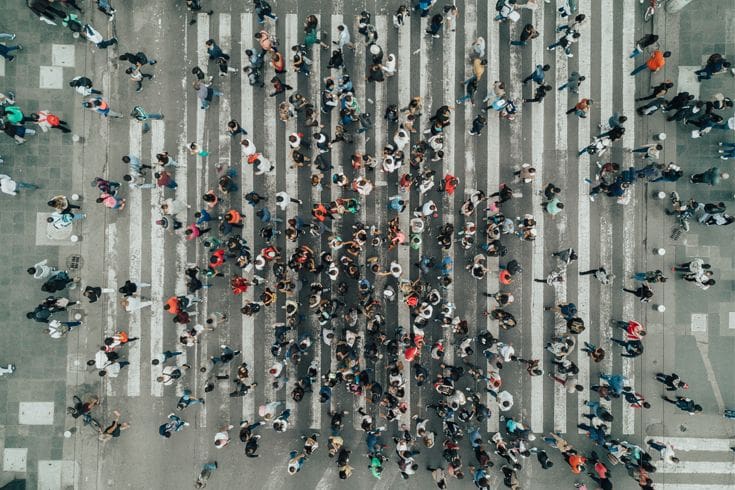Until recently, the idea lived on the political margins. Then the pandemic changed everything
HOW YOU FEEL about the idea of the government giving people free money depends a lot on where you sit on the political spectrum. For some, a universal basic income (UBI) is a sensible way to fight poverty and share prosperity while, for others, it’s an invitation to sloth and moral decay. But, until this year, it was mostly an idea that lived on the margins of the political mainstream, debated and discussed in academic circles and overlooked by almost everyone else. Then, as with so many other things, COVID-19 changed everything.
Now, in the span of just a few weeks, the idea of a UBI has moved to the front lines in the increasingly urgent effort to support economies that have been waylaid by the measures being taken to fight COVID-19. And, while it has traditionally been the exclusive territory of wonkish economists and progressive politicians, it is now supported—and in some cases championed—by high-profile conservatives who would have shunned it just a few months ago. In mid-March, Utah senator Mitt Romney publicly endorsed the concept, and a few days later, a version of it found its way into Donald Trump’s $2 trillion (US) economic stimulus package, which will provide each American adult with a $1,200 “recovery rebate.” In the United Kingdom, prime minister Boris Johnson indicated that he was willing to consider the idea, and on April 3, the editorial board of the Financial Times, one of the most unabashedly procapitalist publications in the world, wrote that “policies until recently considered eccentric, such as basic income and wealth taxes, will have to be in the mix.”
Here in Canada, it’s a former adviser to Conservative prime minister Stephen Harper who has most vocally (and effectively) made the case for a $2,000-per-month cash payment to all Canadians. “While it pains me as a conservative to suggest this,” Ken Boessenkool wrote in a Globe and Mail op-ed, “the government should consider adding another $27-billion dollar expenditure for a Crisis Basic Income as a supplement to what has been announced.” He’s not alone. On April 2, the Business Council of Alberta, an organization that was founded last year by heavyweights like former pipeline executive Hal Kvisle and TransAlta CEO Dawn Farrell, endorsed an even more generous temporary payment of $2,500 a month.
Conservatives aren’t suddenly flocking to the idea of a UBI because of a newfound concern with structural poverty or income inequality. They’re doing it because it’s the most efficient way to get money into the hands of individuals and prevent the economy from seizing up completely—and because it largely cuts government bureaucracy out of the equation. But they may soon find that their preferred economic cure to the coronavirus will long outlive the enemy it was intended to fight. After all, income taxes were first introduced as temporary measures intended to address a short-term crisis and are still with us today. The Spanish government has already announced its intention to not only implement a basic income but also, according to economy minister Nadia Calviño, to make sure it’s something that “becomes a structural instrument, a permanent instrument.” Will Canada be next?
THE PREPANDEMIC case for a universal basic income was both simple and seductive. As income inequality continues to grow and the disruptive impact of technology leads to less security and stability for a growing list of industries and careers, a UBI can protect people from slipping through the ever-expanding cracks in our social safety net. That was the pitch that Andrew Yang, a forty-five-year-old tech entrepreneur, made in his 2018 book, The War on Normal People—and in his surprisingly successful campaign for the Democratic presidential nomination. “The challenge we must overcome,” he wrote, “is that humans need work more than work needs us.”
Helping us overcome that challenge isn’t the only thing a UBI could do. Take, for example, its impact on homelessness, a problem that governments across the country continue to struggle badly with. As Tim Richter, the CEO of the Canadian Alliance to End Homelessness, wrote in a 2016 compendium prepared by the Canadian Centre for Policy Alternatives (CCPA), “a guaranteed annual income would also help to make it far less likely that job loss, divorce, family conflict, domestic violence, injury, or illness result in homelessness. And it would help the many homeless people who do not now qualify for other forms of assistance.” Combined with the right housing policies and public services, Richter argued, a UBI “could be transformational in Canada’s response to homelessness.”
Then there’s the impact a UBI would have on smaller communities in this country, ones that have borne the brunt of globalization and urbanization. “Seasonal workers would not be shamed for selling their labour to the industries we benefit from—the fisheries, forestry, tourism, agriculture, outdoor recreation—or pressured in the off-season to seek a job that isn’t there,” wrote Karen Foster, a professor of sociology at Dalhousie University. “If we stick with a system that punishes and treats with suspicion workers in these industries, we will continue to see labour shortages and disappearing small communities.”
And, according to Sheila Regehr, a retired federal public servant and the chairperson of the Basic Income Canada Network, it could even, perhaps counterintuitively, help us manage some of our country’s growing health care costs. “Income is the leading determinant of health,” she wrote. “Poverty and income insecurity translate into expensive health care needs. A key solution to rising health care costs that preoccupy governments is not in the healthcare system; it is in income security.” The connection between poverty and health outcomes probably explains why, in 2015, 194 Ontario doctors signed a letter to then minister of health Eric Hoskins calling for a basic-income pilot program.
But the most important contribution that a UBI could make to our lives is raising our expectations of what governments can—and should—do. “Thinking of basic income in those terms, less as a single program and more as an objective for all governments, changes the frame; it shifts the expectations of government,” wrote Alex Himelfarb and Trish Hennessy, the editors of the CCPA’s 2016 compendium. “It holds up a guiding point by which to assess government initiatives to alleviate poverty, to reduce income inequality and to address precarity in the labour market.”
That’s even more important today. COVID-19 has already badly wounded our economy and killed more than 2,500 Canadians, but it is also opening our eyes to the possibility that, contrary to what we’ve been told so often by so many over the last few decades, governments can be a powerful force for good in our lives. As Nathaniel Erskine-Smith, a Toronto Liberal MP, noted during a recent episode of the podcast he hosts, “Hopefully, this is a policy measure that we’re able to build on into the future, and someone having this conversation decades from now will say, ‘Out of that crisis, we saw a major social-policy shift and expanding of the social safety net in a way that reduced poverty in the most serious way in generations.’ Maybe some good can come from such a horrible situation.”
THE FIRST real-world test of this unconventional idea began, appropriately enough, in the wake of an era when all kinds of unconventional ideas got tested: the late 1960s. In the four American pilot programs, which took place in big cities, like Seattle and Denver, as well as in rural areas, the data suggested some reduction in the “willingness to work” of the people who received a guaranteed basic income. But data from Manitoba’s 1970s “Mincome” project, which ran pilots in Winnipeg, Dauphin, and a collection of rural sites in the province, eventually suggested that the money had a negligible impact on work rates with the exception of postsecondary students and women who were caring for young children.
In both cases, though, the experiments were small in scale and the data anything but conclusive—something that invited attacks from both sides of the political spectrum. In the years since, the right has used these examples to confirm the belief that giving people free money turns them into feckless layabouts. On the left, meanwhile, there was a very real concern that a universal basic income was simply an attempt to replace social programs that people depended on—a bait-and-switch that would give governments cover to weaken the social safety net progressives had fought so hard to build. The fact that the idea had the support of Milton Friedman, the American economist who helped lay the intellectual foundations for the kind of conservative thinking that produced politicians like Margaret Thatcher and Ronald Reagan, naturally fed that fear. And so, with those battle-lines drawn, the question largely faded from view until it was revived in Ontario by Kathleen Wynne’s Liberal government, in 2017.
Wynne’s three-year, $150 million pilot program was intended to provide a fixed income for people with low or no earnings in Brantford, Hamilton, Lindsay, Thunder Bay, and a few smaller municipalities. Single people were eligible to receive up to $16,989 annually and couples as much as $24,027, with all of these payments reduced by 50 cents on every dollar of earned income. But, just ten months into the program’s lifespan, it was cancelled by Doug Ford’s newly elected conservative government, with the final payments being made last March. The reason, according to Lisa McLeod, the former minister of children, community, and social services? “When you’re encouraging people to accept money without strings attached, it really doesn’t send the message that I think our ministry and our government wants to send,” she told the Canadian Press.
As it turns out, though, the program appeared to have been delivering results. According to a recent survey of 217 of its participants, Ontario’s UBI experiment was improving lives, reducing poverty, and allowing people to make better choices—exactly as its proponents had predicted. According to Wayne Lewchuk, a McMaster University economics professor who helped design the survey, more than three-quarters of respondents who had been working before the pilot stayed employed, with many using the payments to improve their circumstances. “Many of those who continued working were actually able to move to better jobs, jobs that had a higher hourly wage, that had in general better working conditions, that they felt were more secure,” he told the CBC’s As It Happens. Rather than discouraging people from working, the money bought them time to find better and more fulfilling jobs—ones that would ultimately create more tax revenue for the government.
Just as importantly, the survey showed substantially improved health outcomes for the pilot program’s participants, with the vast majority of respondents indicating everything from a better diet and more positive relationships with family members to fewer hospital visits. “What became clear is that, as people moved to some stability, their health improved, their mental health improved, their outlook on life improved,” Lewchuk said. “You have to believe that actually made them more employable.”
A NATIONAL UBI would be a major shift in Canadian public policy, but we’ve actually had forms of guaranteed income for quite some time now. Both Old Age Security, which has been around for nearly a century, and the Guaranteed Income Supplement give seniors the equivalent of a universal basic income. Parents, meanwhile, receive the Canada Child Benefit, which has been increased in recent years and helped lift nearly half a million children out of poverty in the process. “The issue for Canada is not whether a good basic income is possible but who is currently left out,” Regehr wrote in a 2016 compendium produced by the CCPA. “How can we fix that?”
The answer, prior to the outbreak of COVID-19, was clear: pay more taxes. In 2018, Canada’s parliamentary budget officer estimated that, if a national UBI were constructed along the lines of Ontario’s pilot program, it could cost as much as $79.5 billion. If existing federal programs that support low-income Canadians and vulnerable groups were withdrawn, that would reduce the net cost by $32 billion and leave the final bill at $44 billion. Last’s year federal budget predicted that a GST at 5 percent would bring in $40 billion. Covering another $44 billion in spending would mean at least doubling the rate. Given the resistance that tends to get mounted at even the hint of a minor tax increase, it stands to reason that jacking up the GST could incite protests in large parts of the country.
Today, though, it’s a different story. And, just as we saw a major reassessment of the role that governments should play in the aftermath of the Second World War, we may well see a similar adjustment in the wake of COVID-19. “Beyond defeating the disease, the great test all countries will soon face is whether current feelings of common purpose will shape society after the crisis,” the Financial Times’ editorial board wrote recently. “As western leaders learnt in the Great Depression, and after the second world war, to demand collective sacrifice you must offer a social contract that benefits everyone.” There might not be a better way to do that than by implementing a universal basic income.





















